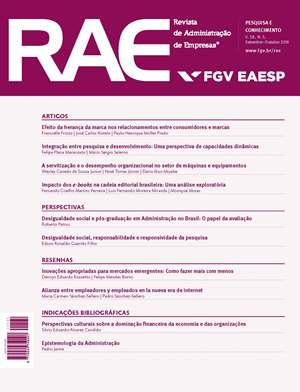The effect of brand heritage on consumer-brand relationships
Main Article Content
Abstract
ABSTRACT
Heritage is a brand value proposition that provides a unique basis for building and maintaining strong relationships with consumers. Seeking to understand how this strategic resource influences the relations between consumers and brands, this study aims to examine brand heritage as a determinant of the self-reinforcing elements (enticing, enabling and enriching-the-self). A survey was carried out with 309 Brazilian and American consumers to test the proposed relationships. Based on a structural equation model, the results demonstrated that consumers process the characteristics related to brand heritage through the three self-reinforcing elements, but their overall effect on self-brand connection occurs only through sensory and aesthetic pleasure that the brand offers (enticing-the-self). The study also presents academic and managerial implications and makes recommendations for future research.
Downloads
Metrics
Article Details
A RAE compromete-se a contribuir com a proteção dos direitos intelectuais do autor. Nesse sentido:
- adota a licença Creative Commoms BY (CC-BY) em todos os textos que publica, exceto quando houver indicação de específicos detentores dos direitos autorais e patrimoniais;
- adota software de detecção de similaridades;
- adota ações de combate ao plagio e má conduta ética, alinhada às diretrizes do Committee on Publication Ethics (COPE)
References
Aaker, D. A. (2004). Leveraging the corporate brand. California Management Review, 46(3), 6-18. doi:10.2307/41166218
Balmer, J. M. T., Greyser, S. A., & Urde, M. (2006). The crown as a corporate brand: Insights from and monarchies. Journal of Brand Management, 14(1-2), 137-161. doi:10.1057/palgrave.bm.255003
Banerjee, S. (2008). Strategic brand-culture fit: A conceptual framework for brand management. Journal of Brand Management, 15(5), 312- 321. doi:10.1057/palgrave.bm.2550098
Belk, R. W. (1988). Possessions and the extended self. Journal of Consumer Research, 15(2), 139-168. Recuperado de http://www.jstor.org/stable/2489522
Beverland, M. B. (2005). Crafting brand authenticity: The case of luxury wine. Journal of Management Studies, 42(5), 1003-1029. doi:10.1111/j.1467-6486.2005.00530.x
Bruhn, M., Schoenmüller V., Schäfer, D., & Heinrich, D. (2012). Brand authenticity: Towards a deeper understanding of its conceptualization and measurement. Advances in Consumer Research, 40, 567-576. Recuperado de https://ssrn.com/abstract=2402187
Escalas, J. E., & Bettman, J. R. (2003). You are what they eat: The influence of reference groups and consumers’ connections to brands. Journal of Consumer Psychology, 13(3), 339-348. doi:10.1207/S15327663JCP1303_14
Escalas, J. E., & Bettman, J. R. (2005). Self-construal, reference groups, and brand meaning. Journal of Consumer Research, 32, 378-389. doi:10.1086/497549
Fournier, S. (1998). Consumers and their brands: Developing relationship theory in consumer research. Journal of Consumer Research, 24(March), 343-373. doi:10.1086/209515
Grewal, R., Mehta, R., & Kardes, F. R. (2004). The timing of repeat purchases of consumer durable goods: The role of functional bases of consumer attitudes. Journal of Marketing Research, 41, 101-115. doi:10.1509/jmkr.41.1.101.25090
Hakala, U., Lätti, S., & Sandberg, B. (2011). Operationalising brand heritage and cultural heritage. Journal of Product & Brand Management, 20(6), 447-456. doi:10.1108/10610421111166595
Hirschman, E. C., & Holbrook, M. B. (1982). Hedonic consumption: emerging concepts, methods and propositions. Journal of Marketing, 46(Summer), 92-101. doi:10.2307/1251707
Hudson, B. T. (2007). Longevity among leading brands [Working Paper]. Boston, USA: Boston University.
Interbrand (2007). Best Global Brands. [online] Recuperado de https:// www.interbrand.com/best-brands/best-global-brands/2007/ranking/
Kates, S. M. (2004). The dynamics of brand legitimacy: An interpretive study in the gay men's community. Journal of Consumer Research, 31(2), 455-464. doi:10.1086/422122
Merchant, A., & Rose, G. M. (2013). Effects of advertising-evoked vicarious nostalgia on brand heritage. Journal of Business Research, 66(12), 2619-2625. doi:10.1016/j.jbusres.2012.05.021
Napoli, J., Dickinson, S. J., Beverland, M. B., & Farrelly, F. (2014). Measuring consumer-based brand authenticity. Journal of Business Research, 67, 1090-1098. doi:10.1016/j.jbusres.2013.06.001
Oh, H., Prado, P. H. M. P., Korelo, J. C., & Frizzo, F. (2017). The effect of brand authenticity on consumer-brand relationships [Working Paper]. Curitiba, PR: Universidade Federal do Paraná.
Park, C. W., Eisingerich, A. B., & Park, J. W. (2013). Attachment-aversion (AA) model of customer-brand relationships. Journal of Consumer Psychology, 23(2), 229-248. doi:10.1016/j.jcps.2013.01.002
Park, C. W., MacInnis, D. J., & Priester, J. (2006). Beyond attitudes: Attachment and consumer behavior. Seoul Journal of Business, 12(2), 3-35. Recuperado de https://ssrn.com/abstract=961469
Park, C. W., MacInnis, D. J., Priester, J., Eisengerich, A. B., & Iacabucci, A. (2010). Brand attachment and brand attitude strength: Conceptual and empirical differentiation of two critical brand equity drivers. Journal of Marketing, 74(6), 1-17. doi:10.1509/jmkg.74.6.1
Rose, G. M., Merchant, A., Orth, U. R., & Horstmann, F. (2016). Emphasizing brand heritage: Does it work? And how? Journal of Business Research, 69(2), 936-943. doi:10.1016/j.jbusres.2015.06.021
Schmitt, B. (2013). The consumer psychology of customer-brand relationships: Extending the AA relationship model. Journal of Consumer Psychology, 23(2), 249-252. doi:10.1016/j.jcps.2013.01.003
Urde, M., Greyser, S. A., & Balmer, J. M. T. (2007). Corporate brands with a heritage. Journal of Brand Management, 15(1), 4-19. doi:10.1057/ palgrave.bm.2550106
Wiedmann, K. P., Hennigs, N., Schmidt, S., & Wuestefeld, T. (2011). Drivers and outcomes of brand heritage: Consumers’ perception of heritage brands in the automotive industry. Journal of Marketing Theory and Practice, 19(2), 205-220. doi:10.2753/MTP1069-6679190206
Wuestefeld, T., Hennigs, N., Schmidt, S., & Wiedmann, K.-P. (2012, February). The impact of brand heritage on customer perceived value. Der Markt: International Journal of Marketing, 51, 51-61. doi:10.1007/ s12642-012-0074-2







